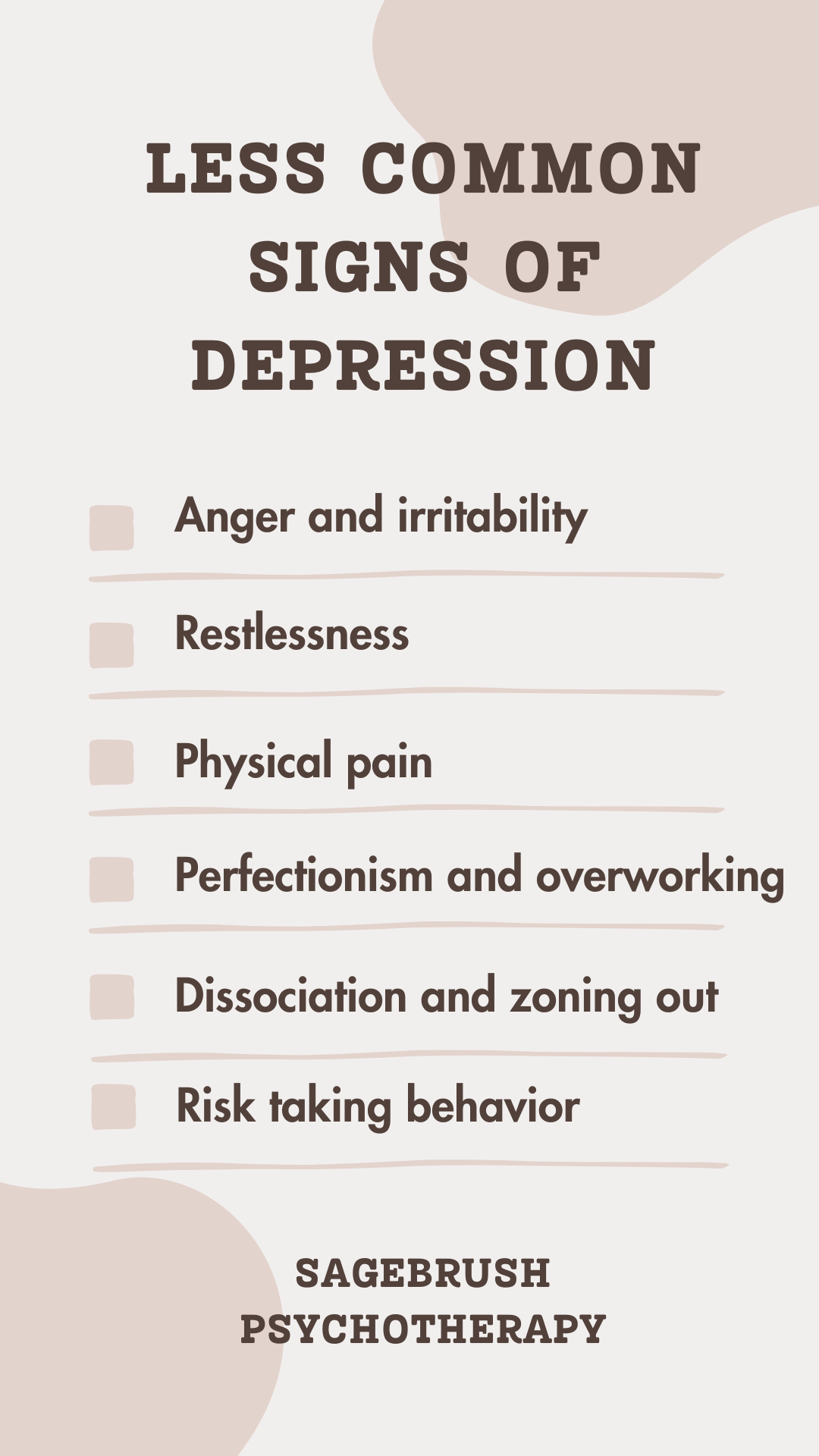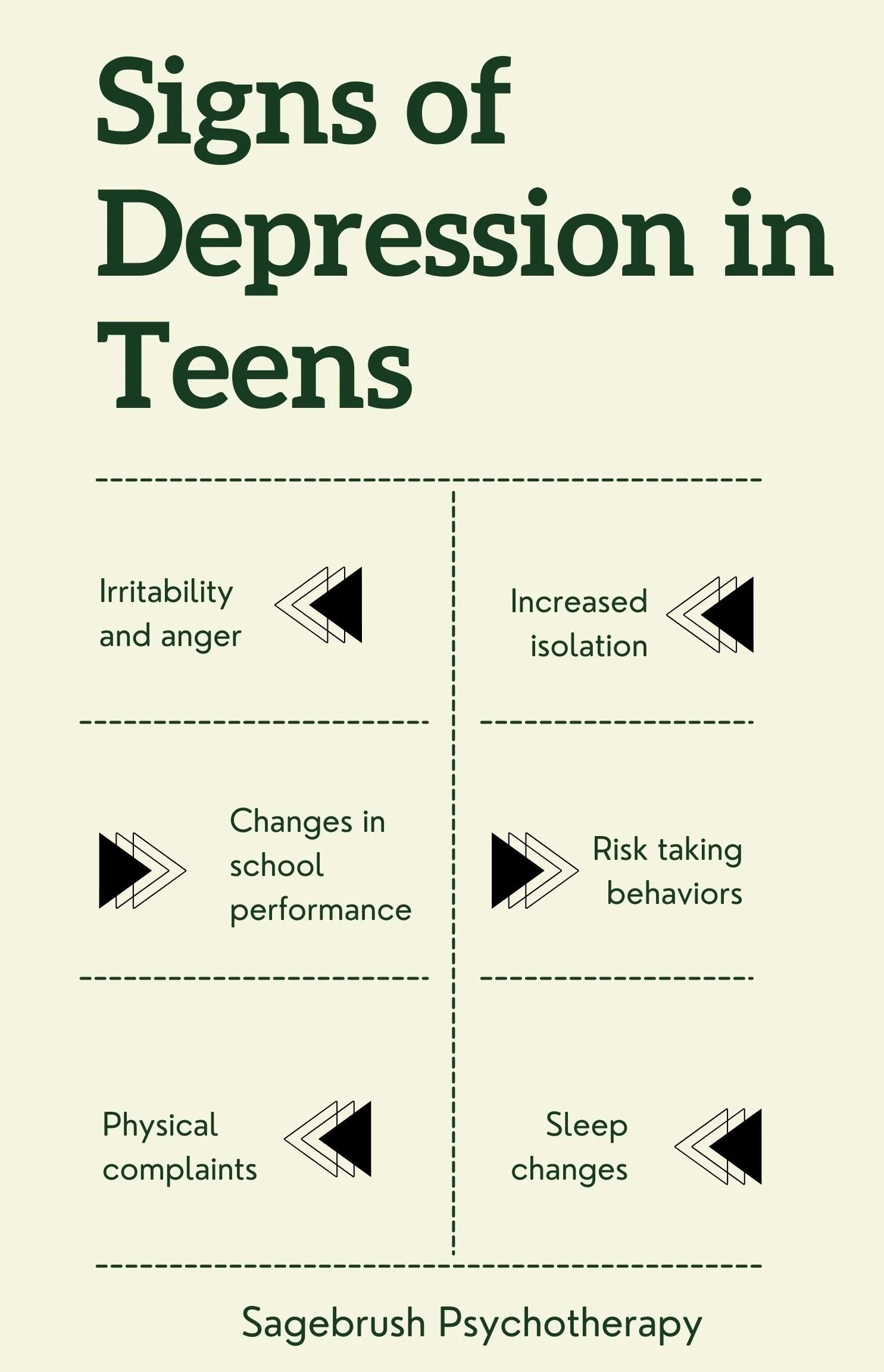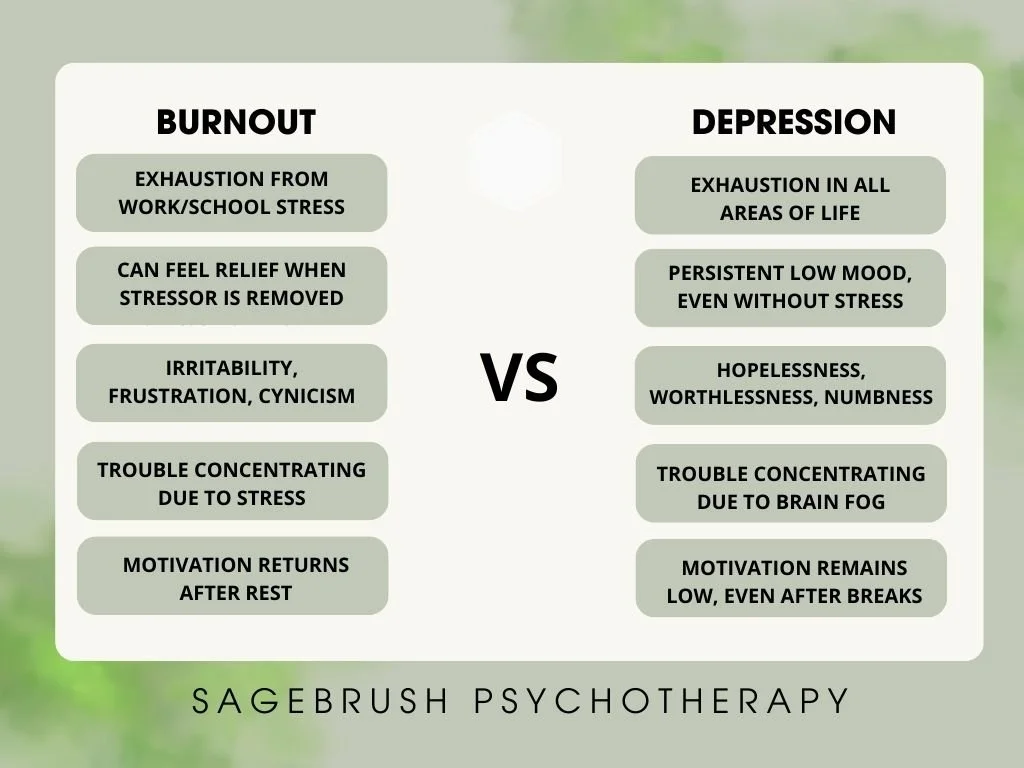Depression Treatment Los Angeles
On this page:
The Impacts of Depression, Therapy Approaches We Use in Treating Depression, Understanding Mental Health Conditions with Depressive Symptoms, Treatment-Resistant Depression, Depression Treatment for Adolescents, Suicidality & Hopelessness, Depression and Burnout, The Link Between ADHD and Depression
Exploring Depression Therapy in Los Angeles
If clinical depression is making it hard to live the life you want, we see you. Maybe you feel weighed down by exhaustion, hopelessness, overwhelm, or a loss of motivation. Perhaps you’re struggling with persistent sadness, irritability, sleep issues, or thoughts of giving up. At Sagebrush Psychotherapy in Los Angeles, we specialize in depression treatment to help individuals break free from the grip of depression and reconnect with a sense of purpose, energy, and hope through compassionate, evidence-based mental health services.
Depression Symptoms (Including the Unexpected Ones):
Common Symptoms:
Persistent sadness, emptiness, or numbness
Feeling hopeless
Feeling worthless or excessive self criticism
Difficulty concentrating or making decisions
Loss of interest in activities
Fatigue or lack of motivation
Sleep issues (insomnia or sleeping too much)
Appetite changes (eating too much or too little)
Less Common Symptoms:
Anger and Irritability – Snapping at others, feeling easily frustrated
Restlessness – Feeling "on edge" even when exhausted
Physical Pain – Headaches, stomach issues, body aches
Perfectionism and Overworking – Using productivity to avoid emotions
Dissociation & Zoning Out – Feeling detached from reality or experiencing moments of disconnection.
Risk-Taking Behavior – Engaging in reckless or impulsive activities as a way to cope.
The Impacts of Depression
Daily Life: When Everything Feels Like Too Much
Depression doesn’t just bring sadness—it can make life feel meaningless, disconnected, and exhausting. You might notice:
A lack of purpose—struggling to find motivation or meaning in daily life
No hobbies or interests—activities that once felt enjoyable now feel dull or pointless
Persistent emptiness—a feeling that nothing truly matters, even when things are "going well"
Changes in sex life—reduced desire, difficulty feeling connected with a partner, or feeling emotionally detached during intimacy
Even when you want to engage with life, clinical depression can make it feel like you’re just going through the motions.
Relationships: When Depression Creates Distance
Depression can make relationships feel distant, even with people who care. You may find yourself:
Lacking friendships or community, feeling like you don’t belong anywhere
Withdrawing into isolation, avoiding responsibilities, conversations, or even simple tasks
Struggling to express emotions, making it hard to feel truly understood
Feeling like a burden, even when loved ones want to help
The more depression pulls you into isolation, the harder it becomes to reach out for support—creating a cycle of loneliness and disconnection.
Self-Esteem: The Weight of Self-Doubt
Depression often brings harsh self-criticism and feelings of unworthiness. You might think:
I’m not good enough.
I’m failing, even when I’m trying my hardest.
My efforts don’t matter.
Things will never get better.
These thoughts aren’t the truth—they’re depression’s way of keeping you stuck. But you don’t have to stay in this place.
Seeking depression therapy in Los Angeles can help you address your relationships, daily difficulties, and self esteem. There is hope.
Effective Depression Treatment in Los Angeles: Our Approach
Our treatment team in Los Angeles uses evidence-based therapies to help you manage symptoms, address underlying causes, and regain a sense of purpose.
Therapy Approaches We Use in Treating Depression
We offer both individual therapy and group therapy to support individuals struggling with mental health issues, including major depression. Individual talk therapy allows us to dive deeper into the underlying causes of your depression. In a safe and supportive space, we take look at the whole person and explore different factors that contribute such as stress, family conflict, and relationship difficulties. Group therapy provides a space to connect with others who understand what you’re going through. Led by skilled therapists, group therapy helps you share experiences and gain support from others facing similar challenges, learn new coping skills in a supportive environment, and reduce feelings of isolation and loneliness. For many, combining individual therapy with group therapy offers a well-rounded, effective treatment for depression.
Cognitive Behavioral Therapy (CBT): CBT is an evidence based treatment for depression that helps you identify and challenge negative thought patterns and change your behaviors to address depressive symptoms.
Dialectical Behavior Therapy (DBT): DBT is especially helpful for those struggling with irritability, suicidality, or substance use as part of their depression. Our DBT skills groups assist with learning skills to manage intense emotions, develop distress tolerance skills, improve relationships and communication, and cultivate mindfulness and present-moment awareness.
Psychodynamic Therapy: Explores the origins of depression, including unconscious conflicts and past experiences that shape emotional patterns. By developing insight around these deep-rooted influences, psychodynamic therapy helps individuals break free from long-standing patterns.
Acceptance and Commitment Therapy (ACT): ACT is an effective treatment for depression that focuses on: accepting difficult emotions instead of avoiding them, identifying and committing to personal values to create a meaningful life, and developing mindfulness techniques to reduce emotional suffering. By helping individuals move away from avoidance and into meaningful action, ACT supports a more fulfilling and engaged life.
Other Therapy Approaches: In addition to traditional talk therapy, approaches like Eye Movement Desensitization and Reprocessing (EMDR) and somatic therapies can be effective in treating depression. EMDR helps reprocess distressing memories that may contribute to depression. Somatic therapies focus on the mind-body connection, helping to regulate the nervous system and release stored tension.
There is no one-size-fits-all solution for depression. We take a personalized approach, working collaboratively to find the therapy that best fits your needs, whether it's skill-building, deep emotional exploration, or body-based healing. No matter where you are in your journey, we are here to support you in finding the path that feels right for you.
Understanding Mental Health Conditions with Depressive Symptoms
Depression is a core feature of many mental health disorders, but not all depression looks the same. Major depression falls under the umbrella of mood disorders and involves persistent depressive symptoms that last at least two weeks or longer, significantly impacting daily life. However, other disorders also include elements of depression, making it important to distinguish them for accurate diagnosis and effective care.
Bipolar disorder: Includes episodes of major depression, but these periods alternate with manic or hypomanic states, where individuals experience elevated mood, increased energy, or impulsivity.
Seasonal Affective Disorder (SAD): A form of mental illness that causes depressive symptoms in response to seasonal changes, often occurring in winter months when there is less sunlight.
Postpartum depression: Affects individuals after giving birth, causing intense sadness, exhaustion, and difficulty bonding with the baby, which goes beyond the typical "baby blues."
Dual diagnosis: When mental health issues coexist with substance use.
Identifying whether symptoms stem from major depression, bipolar disorder, or other mental health conditions is key to accessing the right mental health services. Our treatment team is skilled in assessing your mental health needs and identifying the most effective approaches for treating depression, ensuring you receive the right care to support your overall well-being.
When Depression Won’t Lift: Treatment-Resistant Depression
Seeking help for depression takes courage, and it can be deeply discouraging when therapy or medication hasn’t brought the relief you hoped for. You may have done the hard work—showing up to sessions, trying different strategies, adjusting medications—only to still feel stuck. We understand the exhaustion of trying and not seeing results. Depression is complex and deeply personal, and what didn’t work before may not have been the right fit, the right timing, or the right approach. That doesn’t mean you can’t find relief.
Adjunctive Treatments
When addressing severe depression our treatment team assesses your specific needs when creating your customized treatment plan. Outside of talk therapy we can discuss adjunctive treatments like EMDR (Eye Movement Desensitization and Reprocessing), which is a trauma specific treatment. We can assist with medication management by providing referrals to psychiatrists who specialize in complex cases. Finally we address the whole person and utilize holistic approaches that address sleep hygiene, movement, and mindfulness because depression is a mental illness that affects both the mind and body.
There is hope
Many of our clients have been through therapy before. What makes our approach different is how we combine radical kindness with directness, creating a space where you feel deeply seen and supported while also being challenged to break through what’s keeping you stuck. We don’t just listen—we help you take real steps toward change. Our work together focuses on identifying what was missing in past treatment, whether it was unprocessed trauma, a lack of concrete skills, or a therapy approach that didn’t align with your needs. We balance warmth with action, offering a direct yet compassionate approach that ensures therapy is not just a space to talk, but a space for transformation. Some people need structured skill-building, while others need to process deep-rooted emotional pain. We adjust our methods to fit your needs, not the other way around.
If you’ve been let down by past treatment, trying again takes real courage. We honor that. We believe in real change that comes from deep connection and the right approach. Let’s find the path that works for you.
Depression in teenagers often looks different from depression in adults. Many teens don’t show obvious sadness—instead, they might seem angry, moody, or withdrawn.
Signs of Depression in Teens:
Irritability & Anger – Easily frustrated, lashing out at family/friends
Increased Isolation – Spending more time alone, avoiding social activities
Changes in School Performance – Drop in grades, lack of motivation
Risk-Taking Behaviors – Reckless driving, substance use, skipping school
Physical Complaints – Frequent headaches, stomach aches, unexplained pain
Sleep Changes – Insomnia or excessive sleepiness
Teens with depression may not always say they feel sad—instead, they might say they feel “bored,” “annoyed,” or just “don’t care” anymore.
If you’re a parent worried about your teen, therapy can provide a safe, supportive space for them to process their emotions and learn coping skills.
Depression Treatment in Los Angeles for Adolescents
When Depression Feels Overwhelming: Suicidality & Hopelessness
We specialize in working with people who experience suicidal thoughts and deep emotional pain. Depression isn’t just sadness—it can feel like being stuck in a dark hole, where everything feels heavy and hopeless. Suicidal thoughts arise because you want relief from the pain. It may feel like like no one could possibly understand. But we do.
We know how exhausting it is to keep going. We also know that change is possible, even when you can’t see it yet. Our approach helps you create space between yourself and these thoughts so they don’t feel so overwhelming. We help you find real ways to manage the pain while working through what’s underneath it. We don’t avoid hard conversations—we meet you where you are, with honesty and care, and help you move toward something better.
If you're in crisis, please reach out for immediate support:
📞 988 (Suicide & Crisis Lifeline)
📞 Los Angeles 24/7 Help Line: (800) 854-7771
Depression and Burnout: When Exhaustion Becomes Something More
Burnout and depression can look alike, but they’re not the same. Burnout is typically linked to chronic stress, overwork, and emotional exhaustion, while depression is a deeper, more persistent condition that affects every part of life. However, untreated burnout can lead to depression, especially in high-stress jobs, caregiving roles, or those managing neurodivergence like ADHD.
When burnout progresses to depression, rest alone isn’t enough. If you’re feeling persistently hopeless, numb, or unable to recover your motivation, therapy can help you process your stress, rebuild emotional resilience, and prevent long-term emotional depletion.
The Link Between ADHD and Depression
People with ADHD are more likely to experience depression, often because of the daily struggles of living with executive dysfunction, rejection sensitivity, and feelings of underachievement. When ADHD symptoms—like forgetfulness, disorganization, and emotional overwhelm—become frustrating, exhausting, and isolating, depression can follow.
Signs of Depression in People with ADHD:
Low motivation – Feeling unable to start or finish tasks, even those you once enjoyed
Emotional exhaustion – The constant mental effort of managing ADHD symptoms leading to deep fatigue
Increased self-criticism – Feeling like you’re “always behind” or “never good enough”
Hyperfixation to avoid emotions – Overworking, binge-watching, or scrolling to numb feelings
Irritability & overwhelm – Difficulty regulating emotions, especially frustration and sadness
ADHD-related depression can be uniquely frustrating because executive dysfunction can make it harder to seek help, stick to routines, or maintain consistent self-care. Therapy can help you break out of shame cycles, develop realistic coping strategies, and navigate both ADHD and depression with more self-compassion.
Start Depression Treatment in Los Angeles, CA
If depression is affecting your daily life, relationships, and sense of self-worth, know that healing is possible. At Sagebrush Psychotherapy in Los Angeles, we provide comprehensive, evidence-based depression treatment designed to meet your unique needs. We offer individual therapy, group therapy, and specialized treatments to help you regain a sense of purpose and connection.
We understand that depression looks different for everyone—it can be linked to burnout, ADHD, trauma, or co-occurring mental health challenges. No matter where you are in your journey, you don’t have to go through this alone. We provide depression therapy both online and in person in Los Angeles to ensure you have access to the support you need.







